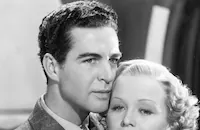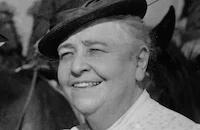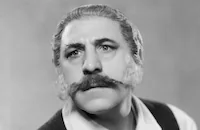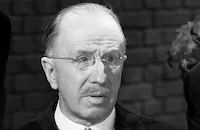Poor Little Rich Girl

Brief Synopsis
Cast & Crew
Irving Cummings
Shirley Temple
Alice Faye
Gloria Stuart
Jack Haley
Michael Whalen
Film Details
Technical Specs

Synopsis
When Barbara Barry, the daughter of a wealthy, widowed soap manufacturer, sneezes three times at dinner, her overly strict, spinsterish servant Collins sends her to bed and calls both the doctor and her father's office. Her father is busy inspecting chorus girls for his new advertising exhibition, but when he is told that Barbara is ill, he rushes home to find that it was only Collins getting panicky. Over Collins' objections, Barbara's kind, matronly servant Woodward convinces Barry to send the girl to a school in the Adirondacks where she could meet other children. Collins takes Barbara to the train station, where a man steals her purse. She leaves Barbara with a porter as she tries to find the thief, and on the street, Collins is hit by a car and then taken to a hospital as an unidentified person. Not knowing what happened to Collins, Barbara eludes the porter and decides that rather than go to school, she will take a "vacation," which Collins told her meant seeing new faces and becoming another person oneself. Barbara sees an organ grinder and asks if his name is "Tony," like the name of the organ grinder in the "Betsy Ware" stories, which Woodward has read to her. When she learns that the man's middle name is, in fact, Antonio, Barbara follows him home. After she identifies herself as Betsy Ware, an orphan, Tony and his wife invite her to spend the night. As Barbara sleeps, a snooping man peers through her window. The next day, in the same tenement, Jimmy Dolan, the optimistic half of the song-and-dance team of Dolan and Dolan, practices tap dancing in preparation for a radio audition. When his cynical wife Jerry hears someone answer his taps in the room below, Jimmy finds Barbara, who is an excellent dancer. After he learns that she is an orphan, Jimmy talks Jerry into putting Barbara in their act. Barbara, who calls Jimmy "Pudd'nhead," another character from the Betsy Ware stories, agrees to pose as the Dolans' daughter, as the ominous man overhears their plans. An enthused advertising agent auditions the Dolans' act and calls Margaret Allen, an advertising executive who works for Barry's rival, the stodgy Simon Peck. Although at first, the irascible Peck refuses to consider them, Barbara wins him over, and the Dolans become a hit doing a nightly show. Meanwhile, Barry romances Margaret, unaware of Barbara's fate. On the night of the Dolans' second show, Margaret and Barry listen to the broadcast. Barry recognizes Barbara's voice, and after he ascertains that she never arrived at the school, he calls the station to have them hold her until he gets there. Thinking that Barry is trying to put something over on him, Peck orders the Dolans to take Barbara away. After Barbara confesses to the Dolans that she is Barry's daughter, they become afraid that they will be arrested as kidnappers, so they leave Barbara alone in their apartment and anonymously call Barry to tell him where to find her. The spying man then enters the apartment and tries to drag Barbara away, so that he could hold her for ransom, but the Dolans, now resigned to facing up to their fate, return, and Jimmy fights the man. Barry arrives with the police, and the man is arrested, along with Jimmy and Jerry; however, Barbara explains what happened, and the Dolans are released. When Peck arrives and argues about the contract, Margaret convinces him and Barry to merge the two companies.

Director
Irving Cummings
Cast

Shirley Temple

Alice Faye

Gloria Stuart

Jack Haley

Michael Whalen

Sarah Haden

Jane Darwell

Claude Gillingwater
Paul Stanton

Henry Armetta
Charles Coleman

Arthur Hoyt

John Wray
Tyler Brooke
Mathilde Comont
John Kelly
Leonard Kibrick
Dick Webster
Bill Ray
Lucille Miller

Billy Gilbert
Snowflake
Sam Mcdaniel
Herbert Ashley
Crew
S. C. Chapman
Ralph Cooper
William Darling
B. G. Desylva
Ed. Ebele
Mack Gordon
Jack Haskell
Sam Hellman
Roger Heman
Sam Ledner
Gladys Lehman
Thomas Little
Gertrude Livingston
Harvey Manger
Booth Mccracken
Cyril J. Mockridge
Jack Murray
Harry Revel
John Seitz
Louis Silvers
Rudolph Sternad
Harry Tugend
Thomas Vincent
Gwen Wakeling
Darryl F. Zanuck

Videos
Movie Clip



Hosted Intro
Film Details
Technical Specs

Articles
Poor Little Rich Girl (1936)
Disaster strikes on the journey to school when Barbara's governess Collins (Sara Haden) is killed in a traffic accident and the curious child is soon wandering the streets of the city alone. But Barbara's irrepressible charm leads to her rescue by an Italian organ grinder "Tony" (Henry Armetta) she encounters on the street. His vivacious, fun-loving family immediately takes to the little girl. But it's not long before Barbara's tap-dancing and singing abilities are noticed by their upstairs neighbors Jerry and Jimmy Dolan (Alice Faye and Jack Haley) who decide to integrate adorable Barbara into their radio show routine. Barbara has a transformative effect on all she meets, like the curmudgeonly soap executive Simon Peck (Claude Gillingwater) who frowns on radio advertising but is quickly brought around by the charm-bullet that is Temple.
Poor Little Rich Girl was conceived as a vehicle to capitalize on the box office magic of Shirley Temple, an important Fox bread winner. Among the featured songs were "But Definitely," "When I'm with You" and "You've Gotta Eat Your Spinach, Baby."
Twentieth Century Fox head Darryl Zanuck convinced Gloria Stuart, who appears as Michael Whalen's love interest in Poor Little Rich Girl, to star in the movie despite her haughty, stage-actress reservations by telling her, "Gloria, in a Shirley Temple movie you'll be seen by millions - millions all over the world." (from Stuart's autobiography Gloria Stuart: I Just Keep Hoping)
"He had a point," admitted Stuart who was "sick to my stomach at the thought of doing a Shirley Temple movie" but eventually went on to make another Temple film Rebecca of Sunnybrook Farm (1938). "I still hear from friends and fans," notes Stuart, "'Saw you last night with Shirley Temple.'" Co-star Alice Faye observed in Anne Edwards' Shirley Temple: American Princess, "We were all aware that to be an adult in a Shirley Temple film was a pretty thankless job. You had to work to hold your own." New York Times critic Frank S. Nugent observed "short of becoming a defeated candidate for Vice President, we can think of no better method of guaranteeing one's anonymity than appearing in one of the moppet's films."
Being Shirley Temple was not quite so simple. In Shirley Temple: American Princess her mother Gertrude testified to the great pains she took to keep Temple "grounded." "I do not let Shirley get the idea that she is too important in our scheme of existence...the mother of a famous star has a difficult road to travel. No mother can know how difficult until she has a small celebrity in her own home." Author Anne Edwards recounts that when Gertrude was being interviewed during the making of Poor Little Rich Girl Temple wandered over to ask "Why don't you talk to me? I'm the star."
The rights to Poor Little Rich Girl were acquired by Fox Film Corp. for $40,000 ($20,000 to novelist/playwright Eleanor Gates and $20,000 to the Pickford Co. which held the motion picture rights for a 1917 film, which was directed by Maurice Tourneur and based on the play starring Mary Pickford). Gates, however, stipulated that while Temple could sing and hoof in the film, a musical comedy with chorus girls or an operetta were not sanctioned. A memo from Darryl Zanuck quoted on the AFI website noted "I think we could take any liberties we wanted and write an entirely new story - something that is a light, bubbling musical comedy with plenty of opportunity for Shirley to sing and dance and do clever pieces of business...We should take a very funny story, a plot that has definite comedy situations, and probably adapt one of the adult parts to fit Shirley." The AFI site also notes that the film encountered problems with its German release when the censor authorities rejected the film for distribution because of "non-Aryan names involved" (Irving Cummings, Sam Hellman, Mack Gordon, Sara Haden and Henry Armetta were identified as problematic). Twentieth-Century Fox sent proof that the film actors were, in fact, Aryans. The film proved a great money-maker. By 1939 it had raked in over $2 million in foreign and domestic rentals. The New York Times reported "as a picture, Poor Little Rich Girl is virtually non-existent; as a display window for the ever-expanding Temple talents, it is entirely satisfying."
Director: Irving Cummings
Producer: Raymond Griffith
Screenplay: Sam Hellman, Gladys Lehman, Harry Tugend, based on stories by Eleanor Gates and Ralph Spence
Cinematography: John F. Seitz
Production Design: William S. Darling, Rudolph Sternad
Music: Louis Silvers
Cast: Barbara Barry (Shirley Temple), Jerry Dolan (Alice Faye), Margaret Allen (Gloria Stuart), Jimmy Dolan (Jack Haley), Richard Barry (Michael Whalen), Collins (Sara Haden), Woodward (Jane Darwell), Simon Peck (Claude Gillingwater), Tony, Organ Grinder (Henry Armetta).
BW-79m.
by Felicia Feaster

Poor Little Rich Girl (1936)
Quotes
Trivia
Notes
Although this film bears the title of the Eleanor Gates novel, which was published in New York in 1912, and her play, which was first produced in New York on January 21, 1913, many of the characters and incidents in it are based on an original story by Ralph Spence entitled "Betsy Takes the Air." According to information in the Twentieth Century-Fox Records of the Legal Department at the UCLA Theater Arts Library, Fox Film Corp. acquired the motion picture rights to the play by Gates before they merged with Twentieth Century Pictures. They paid $20,000 to Gates and $20,000 to The Pickford Co., which held the motion picture rights following the production in 1917 of a film based on the play, which was distributed by Artcraft Pictures Corp and starred Mary Pickford. That film was directed by Maurice Tourneur (see AFI Catalog of Feature Films, 1911-20; F1.3493). Gates agreed to allow Shirley Temple to sing and dance in the film, but would not allow the company to make a musical comedy with chorus girls or an operetta. In a memo dated May 11, 1935, J. J. Gain, a Fox official, noted that the company had "found it advisable to make an agreement with Mary Pickford to utilize her services in connection with any ideas she might have on this story. The amount involved for this service will be $10,000." It is not known if Pickford did, in fact, contribute any ideas to the final film. In October 1934, Rose Franken and Eric Knight contributed treatments based on the play, and in 1935, Ernest Pascal wrote one, but it is not known if any of their material was used in the final film.
In a memo to associate producer Buddy DeSylva, dated August 6, 1935, in the Twentieth Century-Fox Produced Scripts Collection, also at UCLA, production head Darryl Zanuck noted that the title, "is a great box-office title." He then went on to explain his own conception of the film: "I don't think anybody in the present generation remembers anything about the old play other than it had to do with a wealthy girl who was sad. Therefore, I think we could take any liberties we wanted and write an entirely new story-something that is a light, bubbling musical comedy with plenty of opportunity for Shirley to sing and dance and do clever pieces of business....We should take a very funny story, a plot that has definite comedy situations, and probably adapt one of the adult parts to fit Shirley." In correspondence in the legal records regarding a plagiarism suit filed by Izola Forrester and Mann Page, the genesis of the story used is described in great detail. According to the correspondence, Ralph Spence wrote the scene in which Shirley Temple appears in the film Stand Up and Cheer (see below) and then severed his connection with the studio. It soon became evident that Temple had stolen the picture, so Spence's secretary, Gertrude Livingston, who was a fan of a radio program starring Baby Rose Marie, wrote a twenty-page outline of an idea for a radio story for Temple. Spence developed her story into a complete story outline, entitled "Betsy Takes the Air," but did not submit it to Fox because of personal differences with Fox's head of production, Winfield R. Sheehan, and held on to it hoping that another child star would be developed who could use the story. In October 1935, after the merger with Twentieth Century, Spence learned that the company was looking for a musical, and he sold the story to them for $5,000. The suit by Forrester and Page was settled in 1941 when Twentieth Century-Fox purchased their story, which they claimed was plagiarized, for $1,000.
In June 1936, before the film's release, Eleanor Gates objected to the use of her name in connection with the film, as she claimed that the story was not hers. DeSylva convinced the legal department to use Gates' name in the credits by stating that they used the Gates title and the "main theme of [a] little rich girl left alone by [her] parents in [a] big house with servants who goes through harrowing experiences resulting in [the] usual reconciliation."
In the film, Temple, while singing the song "But Definitely," does an imitation of Bing Crosby crooning "Where the Blue of the Night," by Crosby, Roy Turk and Fred E. Ahlert. The scenes of the exterior of the Barry estate were taken at 160 So. San Raphael Avenue in Pasadena. Charles Coleman is listed as a cast member in Hollywood Reporter production charts, but his participation in the final film has not been confirmed. In 1937, the film was rejected by one of the censor authorities in Germany because of some non-Aryan names involved with it, including director Irving Cummings, writer Sam Hellman, songwriter Mack Gordon, and cast members Sarah Haden and Henry Armetta. Because Twentieth Century-Fox wanted a release to liquidate their debt in that country, they agreed to send proof by official documents that the actors were Aryans. By 1939, according to the legal records, the film, which cost $696,600 to produce, had made $2,354,100 in total rentals, foreign and domestic.















